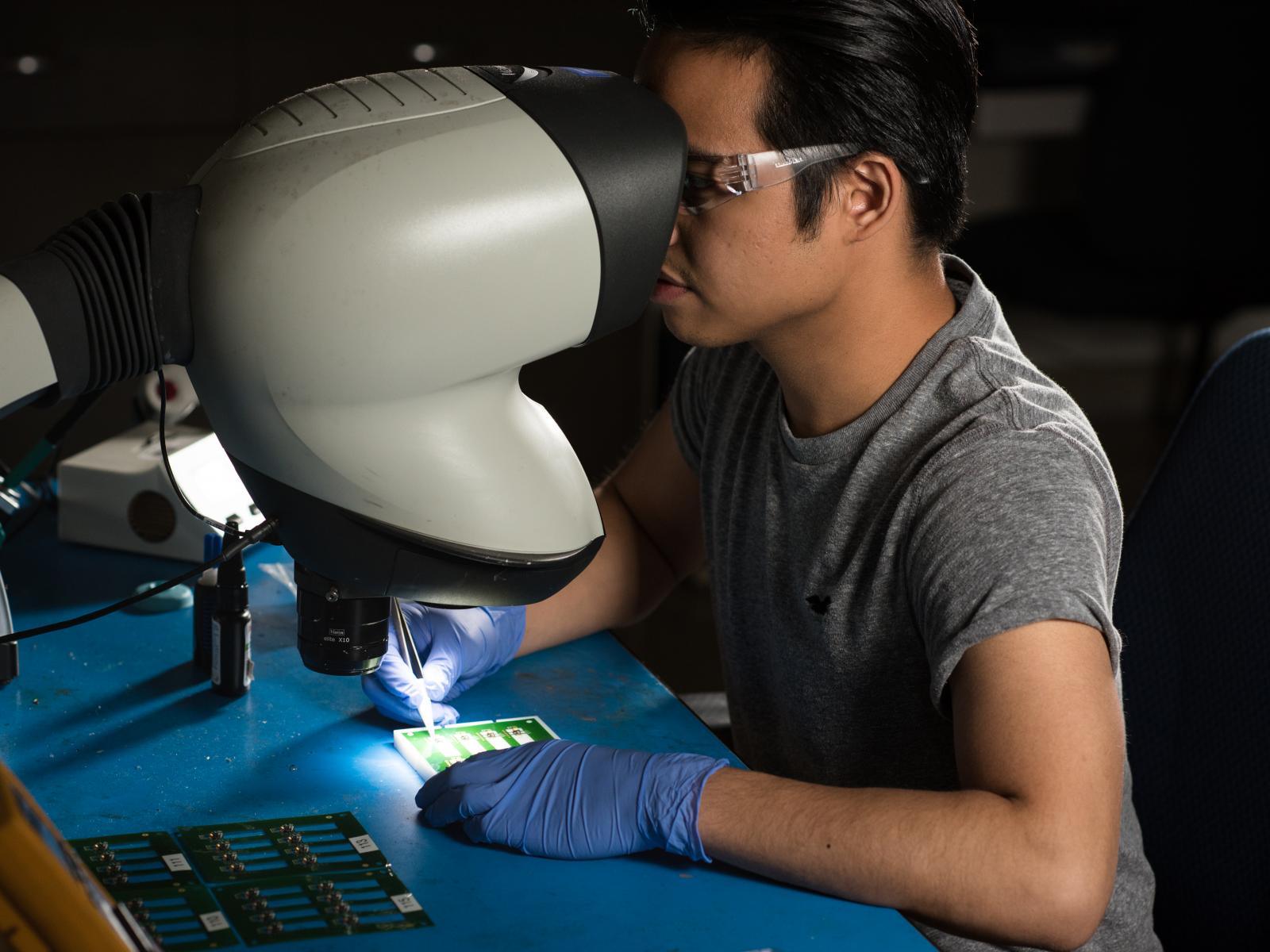Bio-Acoustics and Flow Laboratory

Pacific Northwest National Laboratory (PNNL) is supporting the design of new hydropower systems that minimize or avoid environmental impacts by understanding fish injury and mortality through hydropower systems.
Researchers Aljon Salalila are assembling next-generation acoustic transmitters for remotely tracking sensitive species in one, two, or three dimensions with sub-meter accuracy. PNNL’s tracking and sensing technologies are applicable to a wide range of species, research goals, commercial applications, and locations.
Andrea Starr | Pacific Northwest National Laboratory
At Pacific Northwest National Laboratory’s Bio-Acoustics and Flow Laboratory (BFL), researchers develop and deploy advanced integrated sensor systems to enable energy innovations in some of the world’s most challenging environments—including remote locations, the subsurface, arctic regions, and large hydraulic structures such as dams. Our work supports hydropower and fish passage, marine systems, wind energy, energy storage, building technologies, and smart manufacturing.
Our multidisciplinary team includes chemists, battery engineers, electrical and mechanical engineers, materials scientists, mathematicians, and biologists. Together, we address challenges that span the following:
- Basic material properties and advanced components for acoustic and other sensing technologies
- Integrated, multi-modal sensor systems for harsh and remote environments
- Environmental monitoring, flow characterization, and risk assessment for energy systems
- Telemetry and tracking tools for fish and wildlife in support of energy infrastructure.
BFL is accredited by the American Association for Laboratory Accreditation to international standards for underwater sound measurements between 50 kHz and 500 kHz, fully covering the operating frequency of modern acoustic telemetry and many advanced sensing systems. This accreditation enables us to conduct primary certified testing and calibration of both commercial and PNNL-developed instruments, supporting high-accuracy measurements, troubleshooting, and performance verification.
Our team has extensive experience in laboratory and field deployments, including at hydropower dams, marine energy test sites, wind farms, and other complex field settings. Selected sensor and technology developments include the following:
- Acoustic microtransmitters and receivers for aquatic animals
- Radio-frequency transmitters for small bats and birds
- The autonomous “Sensor Fish” platform in support of advanced hydropower development
- The Marine Animal Alert System for real-time detection of marine life near energy infrastructure
- Acoustic sensors for in situ health monitoring of flow batteries
- Microbatteries for powering small electrical devices
- A self-powered ocean buoy harvesting arctic ocean wave energy using a triboelectric nanogenerator
- A fast-response refrigerant leak detection sensor
- A self-powered sensing and telemetry system for subsurface environments
- A hybrid phase change material–based thermal gradient energy system for powering uncrewed underwater vehicles.
Since 2015, our team has achieved 19 issued U.S. patents, 10 pending patents, and seven copyrighted software packages, with multiple commercial licenses in acoustics, environmental sensing, and energy storage. Our innovations have been recognized with the following:
- The 2020 Federal Laboratory Consortium Excellence in Technology Transfer Award for the Suite of Fish and Wildlife Tracking Technologies
- A 2021 R&D 100 Award in the IT/Electrical category and the 2021 R&D 100 Bronze Award in Special Recognition: Market Disruptor
- A 2025 R&D 100 Award in the IT/Electrical category
- Three R&D 100 Award Finalist recognitions
- 2022 Inventor of the Year
- Team member elected as a Fellow of the National Academy of Inventors
- Three team members named a Distinguished Inventor of Battelle.
Together, these capabilities position BFL as a national resource for integrated sensing solutions that advance energy innovations in complex and demanding environments.